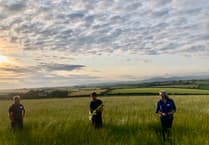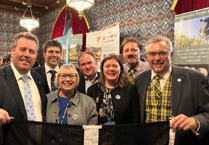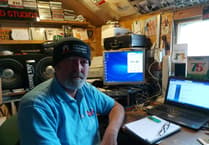“FARMERS don’t really retire, they just slow down a bit,” jokes James Moon as he takes a seat in the living room of his 18th century, six bedroom farmhouse just outside of Liskeard. The house is gradually being emptied of belongings: some of the larger pieces of furniture will stay, James thinks, to be used by the next tenants of Bolitho Farm. James hopes it’ll be a young family. He has one daughter teaching and living upcountry, and the other forging a career in the New Zealand Navy, and so when he shuts the farm gate for the last time, it will bring 145 years of the Moon family’s stewardship of this land to a close. James’ great grandfather Charles signed the lease in 1875, not long after the Bolitho family purchased the farm, signalling the start of a partnership that has endured for four generations.
“Our family had been at Treire Farm, Trewidland and Higher Clicker Farm at Horningtops for about 200 years prior to that,” said James.
“My great grandfather came as a young man for an opportunity to farm on his own. Being near Liskeard to sell at the produce and cattle market was a big advantage. He could drive his own cattle to market, in fact the Moon family was the last family to drive their stock to market via Sungirt Lane.
“On that occasion,” James continues, “the cattle saw their reflection in a shop window and put their heads through the glass – it ended up being quite a costly exercise!”
Bolitho has always been run as a mixed farm, and the labour force at the time of Charles Moon would have numbered at least four or five men on the 175 acres, plus help in the house for the farmer’s wife.
In the last 20 years James has concentrated on beef cattle, specifically South Devon suckler calves, and sheep for breeding and fattening, as well as a small acreage of cereals for feed. James has also been organic for two decades, a move that has led to him being heavily involved with the independent livestock marketing cooperative, the CQLP. A stipulation of the organic label was that animals had to go direct to the abbatoir and not through the livestock market. The CQLP, owned by its farmer members, was founded to help people achieve the best prices for direct sales, and James continues as a director.
But alongside this the Moon family have always been staunch supporters of the local livestock market: and it’s something James still believes has a role in Liskeard.
“Hopefully there will be a place for local produce to be bought and sold,’ he said.
“I’d like to look at not only selling livestock, but encouraging a local abbatoir. One problem is that we sell to abbatoirs who take produce to a hub – it can be taken 200 miles up country to then be brought back down again.”
From an early age James has had a passionate voice to represent his industry, starting with the Young Farmers, and following his father’s footsteps into county leadership roles in the NFU. He was chairman of the local LEADER scheme in the early 2000s, bringing EU funded IT training to farmers in the South West, and more recently has been involved in the Horizon 2020 project, bringing together farming representatives from Spain, France, and Chile amongst others in Liskeard to collaborate on navigating the post Brexit landscape. A thread running through James’ outlook is that things work best from the bottom up. He feels that the new Agriculture Bill offers a lot of potential, so long as regional differences are respected and local areas are allowed to set their own course – he says he’s optimistic that farming minister George Eustice is listening.
He sees the future for farms such as Bolitho in a return, perhaps, to the mixed farming of his forbears, and says he’s a little wary of groups who lobby for one specific species or way of doing things: there are harmonies and compromises to be found in farm ecosystems.”You have to manage it as a whole, and not just for one specific outcome,” he says.
James will continue to work as a consultant, advising around 60 farmers in SE Cornwall and West Devon on farm stewardship payments and the changeover to the new system under the forthcomning agricultural bill.
Through the worldwide Association of South Devon Breeders, James has had the opportunity to visit many countries to share best practice, to discover where the breeding lines have dispersed and see how the animals have evolved in various ways in response to their climate and terrain. “Quite a lot of the South Devons in South Africa for example are descended from cattle bred locally by the Rowes,” he says, bringing to mind a kind of bovine ancestry.com.
A huge map in the living room is dotted with coloured pins – and James is enthusiastic about the travelling he and Christine will be able to do once he’s ’retired’. Having studied at Seale Hayne College and worked in Denmark as a student, James is a strong advocate of youngsters doing some training on someone else’s farm – preferably in a different country, as a way of ’seeing how people that aren’t mum and dad do things, and working as part of a different team’.
It will be a sea change for James as he settles into a modern bungalow on the outskirts of Liskeard. But from his back garden he’ll be able to look over to the farm – and he’ll actually still be tending livestock there, as he’s retaining 20 acres of the estate, and a further 50 acres from other landowners, to keep some cattle and sheep.
As well as his dreams of Patagonia and the Antarctic, James looks forward to continued singing with the Liskerrett and Pelynt Male Voice Choirs and will continue with the Rotary Club.
’’I’m 67 now,” he smiles, “it’s time to slow down a bit – possibly.”
Stags will be holding a collective sale of machinery and a special sale of sheep at Bolitho Farm on Saturday, September 12.
The sale, to start at 10am, will include vehicles, agricultural and horticultural equipment, farming machinery and implements, and furniture.
An entry of 5-600 breeding ewes, ewe lambs, store lambs and breeding rams is expected.




